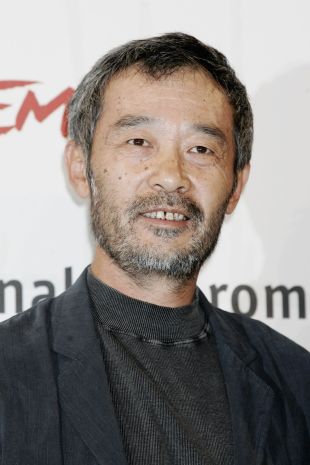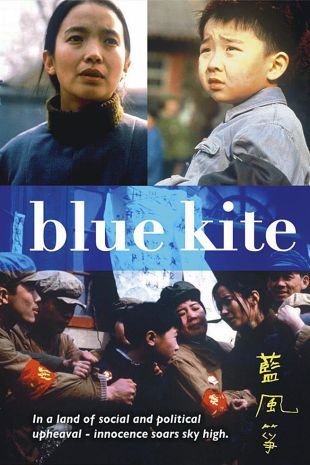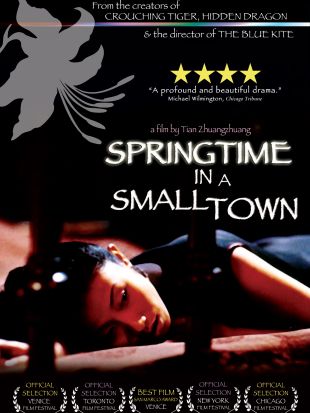Tian Zhuangzhuang is one of the most prominent filmmakers of China's Fifth Generation, along with Zhang Yimou and Chen Kaige. He was born in Beijing in 1952, to a family that was a part of the Communist elite. His father was Tian Fang, a noted actor from the 1930s and a director for the Beijing Film Studios after the Communists gained power. His mother was popular 1950s film star Yu Lan, who later became the head of Beijing's Children's Film Studio. While his elevated status during the relatively stable 1950s was a blessing (Tian was even allowed to sit in on censorship screenings as a child), it proved a serious liability during the mayhem of the Cultural Revolution. At age 16, he was sent to labor in remote Jilin province and later he joined the People's Liberation Army. As society began to calm down at the end of Mao's reign, Tian managed to get an apprenticeship with the government's Agriculture Film Unit, where he served as an assistant cinematographer on several education films and documentaries. In 1978, Deng Xiaopeng set about undoing many of the destructive policies of Mao's final decade, which included reopening the country's schools and universities. As with all of the other major figures of the Fifth Generation, including Chen Kaige and Zhang Yimou, Tian entered the first class of the Beijing Film Academy since the Cultural Revolution.
He co-directed Our Corner (1980), the children's film Red Elephant (1982), and a number of television episodes until he attracted critical attention with On the Hunting Ground (1985), a documentary-style film about the hunting customs of Inner Mongolia. Like Chen Kaige's Yellow Earth (1984), Tian's movie presents the audience with a visually stunning treatment of a remote region of China, told in a challenging, enigmatic style. Unlike Yellow Earth, which was widely praised, this film's experimentalism and ethnographic subject matter failed to gain an audience. Only four prints of the movie were sold. Tian's next endeavor, Horse Thief (1986), commissioned by Xi'an Studio head Wu Tianming, featured a similar fascination with exotic minorities and cinematic experimentation. Ostensibly about a deeply religious man who has to steal the odd horse in order to provide for his family, the film is also a keenly observed meditation on the religious rites and customs of Tibetan society. Both films proved controversial, as older Communist cadre members argued that Tian's work neglected the tastes of the masses. These films have come to be considered some of the finest mainland Chinese films of the 1980s. Bowing to pressure, Tian directed a trio of mainstream films that proved popular domestically: Drum Singer (1987), Rock 'n' Roll Kids (1988), and Li Lianying: The Imperial Eunuch (1991).
After Zhang Yimou's international success with such strongly narrative films as Red Sorghum (1987) and Ju Dou (1990), other Fifth Generation directors, including Tian and Chen Kaige, turned away from pure art films and began producing works directed to the tastes of international film festival audiences. Chen produced his wildly popular Farewell, My Concubine (1992) and Tian produced his masterpiece, The Blue Kite (1993), a heart-wrenching account of contemporary Chinese history from the perspective of a young boy. While Tian's earlier art films had dealt obliquely with the horrors of the Cultural Revolution, this film was one of the first Chinese films to confront it directly. Shot in a neo-realistic style, The Blue Kite shows how a family endures successive tragedies as Mao's state ideology exerts greater and greater control over private life. Instead of sweeping vistas of the Tibetan Plateau, the audience is presented with claustrophobic interiors punctuated by a omnipresent icy white light reminiscent of Stanley Kubrick's later works. The film caused quite a controversy, both because of its politically sensitive subject matter and because Tian submitted the film for overseas exhibition before getting permission from government censors. As a result, he was prohibited from making movies until 1996. In spite of that restriction, The Blue Kite received rave reviews from critics worldwide, winning an award from the New York Society of Film Critics and the 1993 Grand Prize at the Tokyo International Film Festival. Since then, Tian Zhuangzhuang has produced a number of young Sixth Generation-directors' films, such as Wang Xiaoshuai's Zhangda Chengren (1998), in which he also acted.



